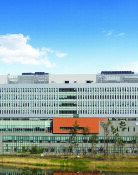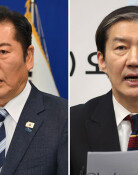Korean Manufacturers Rush to Relocate Abroad
Korean Manufacturers Rush to Relocate Abroad
Posted October. 31, 2006 03:00,
A small and middle-sized clothing company based in Gangnam, Seoul, has recently moved its manufacturing operations to Cambodia.
Though factory relocation costs hundreds of thousands of dollars, they had little choice but to go abroad in an effort to avoid labor-management conflict and high labor cost in Korea. A staff of the clothing company stated, Recurrent labor disputes and increasing labor cost have burdened us so much so as to lose our competitive edge in the world market, and we decided to give up the premium of made in Korea, adding, On the contrary, only hundreds of thousands of dollars are enough to be welcomed by foreign countries with open arms.
Besides the clothing company, in recent years, there have been an increasing number of domestic companies which have moved abroad in a bid to find a better business environment than in Korea.
Korean companies are driven to relocate their operations overseas by labor-management disputes triggered by the notorious radical labor movement, higher wages than those of competing countries, prevalent anti-enterprise sentiment, and inconsistent government regulation policies. The report, Investment Environment Satisfaction Compared with Foreign Nations released by the Korea Chamber of Commerce and Industry (KCCI) on October 30 reveals that Korean companies hold unfavorable opinions on investment conditions in Korea.
According to the report targeted on 300 Korean companies which have invested abroad, investment friendliness in Korea was scored 58.8 (out of 100), which is very poorly evaluated compared to 70.8 for foreign countries.
Furthermore, 52.3 percent of the respondent companies were revealed to have abandoned domestic investment opportunities and made overseas investment instead.
They answered that labor conflict (54.1 percent) was the major drive to overseas relocation. Condition of manufacturing operations (22.8 percent) was singled out as an another main factor of evacuation from Korea, and money market condition (10.3 percent), bureaucratic administration (six percent), and tax regulations (five percent) were most answered, too.
Against the backdrop, the volume of foreign direct investment (FDI) by Korean firms has dramatically surged in recent years.
The Bank of Korea (BOK) announced that total amount of the FDI has almost doubled up to $4,312,000,000 in 2005 from $2,420,000,000 in 2001. As of late September 2006, the FDI amounts to more than $4,970,000,000. It has steeply soared by 49.7 percent compared with the corresponding period of last year, which was $ 3,320,000,000.
sunshade@donga.com




![[단독]이혜훈 “장남 다자녀로 연대 입학”…당시 그런 전형 없었다](https://dimg.donga.com/c/138/175/90/1/wps/NEWS/IMAGE/2026/01/23/133215083.1.jpg)


